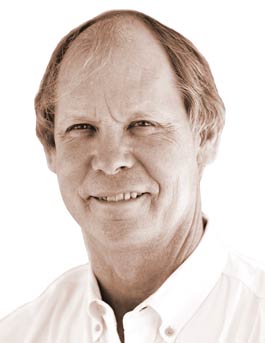A Singular Research Success

Materials scientist Martin Harmer wins coveted Keck Foundation grant of $1 million for ‘groundbreaking research.’
The W.M. Keck Foundation has awarded a $1 million grant to Lehigh to study and discover the mechanisms that govern anti-thermal processes that appear to reverse nature. The work has the potential to revolutionize scientists’ basic understanding of thermal processes and inform the development of new materials that can withstand higher temperatures.
A breakthrough in this area could lead to significant increases in engine efficiency, for example, saving billions of dollars in fuel costs.
Known for funding science and engineering projects with the potential to pioneer new territory in a field, the Keck Foundation has awarded the grant to the project’s principal investigator, Martin Harmer, Alcoa Foundation Professor of Materials Science and Engineering and senior faculty adviser for Engineering Research Initiatives. Harmer’s collaborators on the project, Anti-thermal Behavior of Materials: Reversing the Trend of Nature, are Elizabeth Holm and Gregory S. Rohrer, both professors of materials science and engineering at Carnegie Mellon University.
President John D. Simon said the grant “affirms the groundbreaking work and collaboration being done by our world-class faculty. This is very exciting news, and I thank the Keck Foundation for its continued support of pioneering research and discovery.”
Harmer, Holm and Rohrer will seek to understand why some atoms behave in a manner contrary to nature, a phenomenon about which little is known.
The atoms in solids typically move exponentially faster with increasing temperature, obeying a classical law of physics. This motion fundamentally limits the properties and performance of materials. For example, turbine engine components start to weaken at higher temperatures limiting the maximum operating temperature and efficiency of the engine.
One of the major challenges in condensed matter science is to learn to combat this trend of nature in order to produce materials that are more efficient, resilient and enduring.
“I’m extremely grateful to the W.M. Keck Foundation for its vision in supporting and enabling high-risk research such as this,” said Harmer. “This project will allow us to explore uncharted territory that could potentially uncover the secrets of nature’s counterintuitive thermal behavior and pioneer new approaches to materials science.
“My graduate student, Chris Marvel, refers to anti-thermal behavior as the ‘Benjamin Button phenomenon of materials science,’ where nature reverses its course—I like his analogy!”
Posted on:


